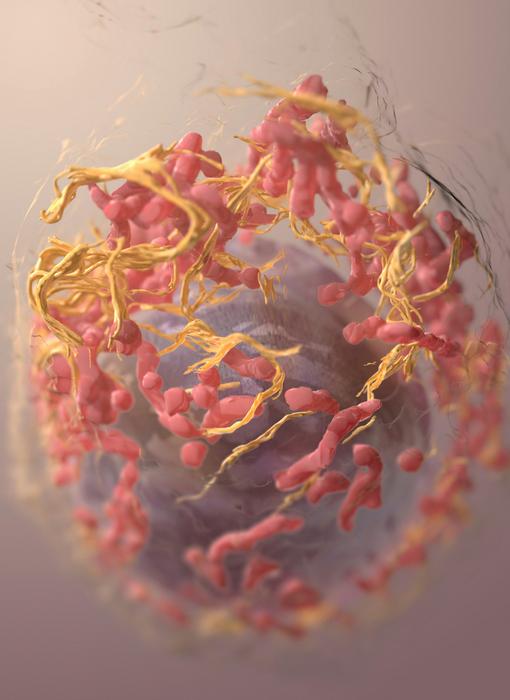In a groundbreaking essay published in the open-access journal PLOS Biology, Sui Huang from the Institute for Systems Biology and his colleagues have initiated a critical reevaluation of the long-held belief that cancer is predominantly a genetic disease. This prevailing theory has shaped the landscape of cancer research for decades, leading to extensive genome sequencing efforts aimed at uncovering the genetic anomalies responsible for cancer’s onset and progression. However, Huang and his team argue that a rigid adherence to genetic determinism may inadvertently hinder advancements in cancer research and treatment.
The conventional narrative surrounding cancer posits that normal cells acquire genetic mutations over time, resulting in uncontrolled growth and proliferation. This linear interpretation has fueled ambitious projects such as The Cancer Genome Atlas, which aimed to catalog the mutations associated with various cancer types to facilitate targeted therapies. Yet, Huang and his co-authors contend that this paradigm is incomplete and often misleading, pointing to the perplexing reality that many cancer cases lack identifiable driver mutations while also noting instances where seemingly healthy tissues possess mutations that could theoretically induce cancer.
Central to Huang’s argument is an appeal to consider broader biological frameworks that extend beyond mere genetic mutations. He emphasizes that cancer cannot be adequately understood without addressing the complexities of its underlying biology, including factors that govern cellular behavior and interactions. By shifting focus to the broader organism, researchers may begin to uncover non-genetic processes that significantly contribute to tumor development.
One such avenue of exploration proposed by Huang is the investigation of gene regulatory networks—complex systems of interactions that dictate when and how genes are expressed. Disruptions in these networks, rather than isolated mutations, may underlie the hallmarks of cancer, significantly altering cellular pathways and leading to malignant transformations. This perspective represents a paradigm shift, where a cell’s fate does not hinge solely on its genetic composition but also on how it interacts dynamically within its microenvironment.
Another compelling avenue presented in the essay is the concept of tissue organization and how disturbances within this organization can incite cancerous growth. Inspired by previous work on the influence of neighboring cells, Huang and his collaborators point to the pivotal role of the tumor microenvironment in shaping cancer progression. They argue that the ‘field disturbance’ caused by surrounding healthy or pre-cancerous cells can instigate changes that promote tumorigenesis. Here, the emphasis is on understanding the tumor as part of a complex biological system rather than as a solitary entity dictated by genetic aberrations.
This reorientation toward non-genetic mechanisms invites a cascade of scientific inquiries aimed at unraveling the myriad factors contributing to cancer’s onset. Moreover, Huang’s essay challenges the prevailing notion that all carcinogens exert their effects through mutagenic pathways. By advocating for a more comprehensive understanding of how environmental exposures—such as certain food additives, plastics, and other toxic materials—can disrupt cellular homeostasis, Huang emphasizes the importance of public health policies that address these non-mutagenic risk factors.
Huang and his colleagues assert that acknowledging the limitations of the genetic paradigm is not merely an academic exercise; it has profound implications for cancer treatment and prevention strategies. If future research can successfully uncover the non-genetic drivers of cancer, it could radically transform how we approach cancer therapeutics, emphasizing prevention and intervention strategies that address the root causes of cellular dysfunction rather than solely targeting genetic mutations.
The ramifications of this new perspective extend into the realm of public health as well. For instance, regulatory frameworks that govern the use of certain chemicals known to impact cellular behavior could be strengthened if the scientific community embraces non-genetic contributions to cancer. Recognizing that cancer can emanate from a multitude of environmental triggers creates a more urgent and comprehensive need for policies focused on reducing exposure to potential carcinogens that do not directly induce mutations.
A significant aspect of this discussion is the concerted need for multidisciplinary collaboration in cancer research. Cancer is inherently complex, and its causative factors are likely intertwined across genetic, epigenetic, and environmental domains. Researchers must work across traditional disciplinary boundaries to forge new insights into cancer biology, promoting an integrative approach that spans molecular biology, epidemiology, and environmental science.
In summation, this essay from Huang and his colleagues serves as a clarion call for a shift in how we conceptualize cancer biology. By moving past the narrow confines of the genetic paradigm, researchers can unlock innovative pathways for understanding the disease—ultimately paving the way for new treatment modalities and prevention strategies grounded in a holistic understanding of human health. As we unravel the complex tapestry of cancer biology, we inch closer to a future where cancer can be addressed not just as a consequence of genetic fate but as a multifactorial disease responsive to a broader array of therapeutic interventions.
Such an evolution in thought may well be what is necessary to catalyze meaningful advances in cancer care—promising new vistas in our collective struggle against this formidable disease.
Subject of Research: Non-genetic theories of cancer
Article Title: The end of the genetic paradigm of cancer
News Publication Date: March 18, 2025
Web References: PLOS Biology
References: Huang S, Soto AM, Sonnenschein C (2025) The end of the genetic paradigm of cancer. PLoS Biol 23(3): e3003052.
Image Credits: National Cancer Institute, Unsplash (CC0)
Keywords: cancer, genetic paradigm, tumorigenesis, gene regulatory networks, tissue organization, public health, non-genetic factors, cancer prevention, multidisciplinary research, environmental carcinogens.
Tags: alternative cancer research approachesbiological complexity in cancercancer biology frameworkscancer progression factorscancer research paradigm shiftcritical reevaluation of cancer theoriesimplications for cancer treatmentlimitations of genetic determinismnon-genetic theories of cancerThe Cancer Genome Atlas critiqueunconventional cancer theoriesunderstanding cancer mutations





